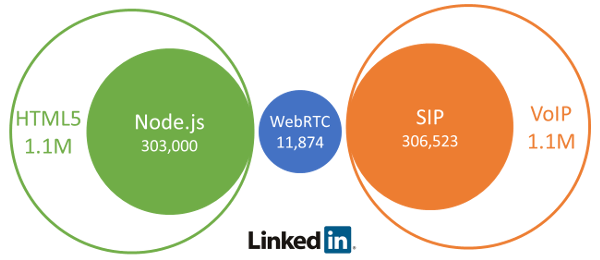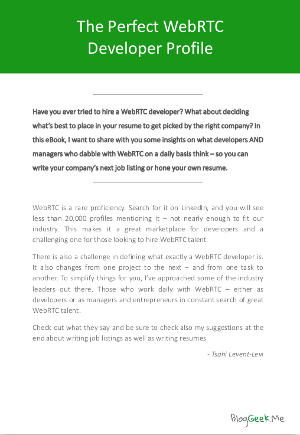And I have a couple of bonuses waiting for you in this WebRTC course launch.
I’ve been thinking lately on how to make this course available throughout the year, but still “launch” it as a live program once or twice every year. The idea here is to get as many people as possible into the course and improve our current market state (which is rather abysmal):

I always say that WebRTC sits between Web and VoIP, but I guess this says it best.
You can find a million people whose profile contain either “VoIP” or “HTML5”. If you go into specifics, you’ll have hundred of thousands of people with either “SIP” or “Node.js”. But “WebRTC”? Only 11,874 righteous people. We’re a pretty small industry. And those with enough understanding and knowledge of WebRTC? Probably less than that.
If you are looking for WebRTC talent, make sure to also read my WebRTC hiring tips!
What are people challenged with?
The request that comes up almost every time someone contacts me through the blog? It is about finding an experienced WebRTC developer. Here are a few “sound bites” from these emails I am getting:
if we were to hire someone to build our own platform – what qualifications in a programmer would I need to look for?!!
We are needing to develop video chat and having a difficult time finding a qualified developer to create this
I am seeking a WebRTC engineer to do a peer review on a WebRTC app I had developed in oversees (west Russia.)
A couple of thoughts about this
- If you are a developer and you know WebRTC well, then your talents are in high demand – and if you aren’t conversant in WebRTC, this can be an opportunity for you to learn and grow
- If you are an employer and you need someone to build a real time comms product, you’re going to be hard pressed to find good talent. Your three best choices are:
- Outsource the whole project to a company who is skilled in WebRTC
- Hire a freelancer to help your team with the WebRTC parts
- Grow your in-house team to make them skilled with WebRTC
- If you are an outsourcing vendor and you have WebRTC talent, then you’ve got a different set of challenges:
- The more projects you take, the more WebRTC talent you need, which means you are back to the hiring challenge as anyone else
- Your best WebRTC talent is always on high demand outside, getting job proposals and needing to think how happy are they (so you have a retention issue in your hands, which gets worse due to the high demands of the skillset you are nurturing)
And since the market is so slim on resources (around 12,000 people know WebRTC out of a million who know VoIP – when all VoIP projects are adding WebRTC these days), demand and supply don’t match.

My WebRTC course and its bonuses
Tomorrow, my Advanced WebRTC Architecture course officially launches. If you haven’t enrolled already, then you should seriously consider doing so.
The previous round had almost 100 students going through it with some very positive feedback.
There are going to be a few bonus materials that I will be giving for anyone who enrolls today (or already enrolled):
#1 – 2 live lessons
There are going to be 2 special live lessons taking place. They will be recorded for those who can’t join live. But the lessons as well as the recordings will only be available as part of the course bonuses.
LIVE Lesson 1: Philipp Hancke – Video Quality in WebRTC: The audio and video quality WebRTC provides is amazing. Well, most of the time at least. Sometimes, the video gets pixelated and audio starts dropping out even. What is going on here and why is bandwidth estimation still a problem?
LIVE Lesson 2: Bradley T. Hughes – How to deploy TURN on AWS? TURN servers are boring. They do nothing but relay data. However, they are necessary in WebRTC. Here’s how appear.in’s global TURN infrastructure works – and how you should think of when deploying your own.
So…
2 live lessons.
With top industry experts.
Recorded and available only for you.
#2 – The Perfect WebRTC Developer Profile ebook
Recently I’ve been asked multiple times about CVs and profiles and stuff. It goes both ways:
- Recruiters want to know what experience to look for in order to find experienced WebRTC developers
- Developers want to know what to learn and put in their CV to be attractive
I had my own thoughts about it, but decided to take a different route on this one. I went and asked top developers and “recruiters” who work with WebRTC for quite some time now. I asked them about the ideal WebRTC developer and what they’d look for in a CV. Collected the answers and created an ebook out of it:

Who’s in there? Amir Zmora, Arin Sime, Chad Hart, Emil Ivov, Gustavo García, Iñaki Baz Castillo and Philipp Hancke.
You’ll get to see what they think about WebRTC developers and what it means to be a WebRTC professional.
#3 – WebRTC Course FAQ
There are a lot of popular questions out there about WebRTC. You can find them lurking on webrtc-discuss forum, stackoverflow, Quora and elsewhere. But what are the answers? And how should you go about finding them?
What I did in the past few weeks was collect questions and map them to the course lessons. To these questions I provided short and clear answers for you, packaging it all in a neat document.
Now, you can use these questions to tackle specific issues you bump into – or to check how much you understood of the lessons of the course. Hell – if you need to recruit someone – you might as well use it as some good questions to ask to gauge experience.
What if you are not sure?
Besides looking at the testimonials from previous students, I can suggest checking out two things:
- My free WebRTC server side mini-course. You can expect this kind of content in the course itself, just on a deeper level, on a lot more WebRTC related topics AND with the option of asking questions on the online course forum or during the live Office Hours
- Join me for the WebRTC Course AMA on Wednesday this week. I will be answering any questions related to WebRTC or the course, so you can make your decision about enrolling to the course (or just get some free advice for your current project)
What if you wait and don’t enroll today?
Bonuses will go away in 48 hours.
After that, the only price plan available for the course will be the Plus price plan and it will only include the Office Hours for the initial duration of this course.
My suggestion?
